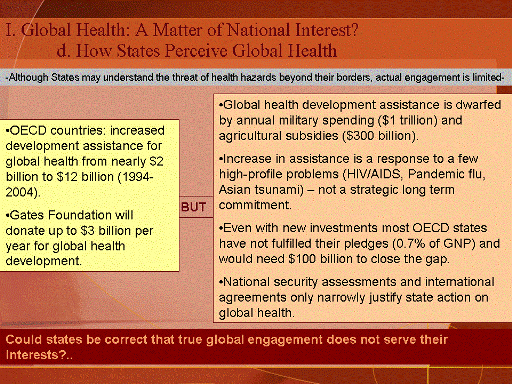Search for most updated materials ↑
| front |1 |2 |3 |4 |5 |6 |7 |8 |9 |10 |11 |12 |13 |14 |15 |16 |17 |18 |19 |20 |21 |22 |23 |24 |25 |26 |27 |28 |review |
 |
D. Do States Perceive
Global Health to be in Their National Interests?
Governments, therefore,
have powerful reasons based on narrow or enlightened self-interest
to ameliorate extreme health hazards beyond their borders. But do
political leaders acknowledge, and act on, this evidence? The answer
may be that States are beginning to understand, but their engagement
in global health is relatively limited. And the sad truth is that
the coincidence of interests is narrower than activists, and even
scholars, have suggested. As U.K. Chancellor Gordon Brown said when
launching the International Finance Facility for global health in
2003, rich countries “just don’t care enough.”
There is little doubt that
developed countries are beginning to see global health as essential
to their national interests. OECD countries have increased
development assistance for global health over the last two decades,
rising from nearly $2 billion in 1990 to $12 billion in 2004. At the
same time, philanthropic organizations have devoted historic sums to
global health. The Gates Foundation alone will donate up to $3
billion per year. This development assistance may appear
substantial, but sits modestly beside the annual $1 trillion spent
on military expenditure and $300 billion on agricultural subsides.
The increase in development
assistance, moreover, is largely attributable to extensive resources
devoted to a few high profile problems: AIDS, pandemic influenza,
and the Asian tsunami. Even factoring in these new investments, most
OECD countries have not come close to fulfilling their pledges of
giving 0.7% of Gross National Income (GNI) per annum. OECD countries
would have to invest an additional $100 billion by 2015 to close the
vast investment gap. With these additional expenditures, WHO
projects that tens of millions of lives would be saved every year.
Rather than a general
commitment to global health, States often prefer “targeted
engagements” to prevent only those hazards deemed most likely to
affect their own citizens. National security assessments and
international agreements offer relatively narrow justifications for
State action on global health. Governments frame the problem as one
of averting direct threats of infectious diseases reaching their
borders, and not to reduce extremely poor health in impoverished
countries.
In many respects, States
may be correct that true global engagement does not serve their
interests. Richer countries almost always have relative health
advantages over poorer countries. The technological capacity to
produce drugs and vaccines, the sophisticated health systems, and
the simple fact that their populations generally are richer and
healthier, means that developed countries usually can safeguard
their citizens by looking inward. One need only examine the
historical and current data on health disparities discussed next to
understand that highly developed countries can, and will, maintain
comparatively high levels of population health by focusing the bulk
of their resources on domestic needs.
|